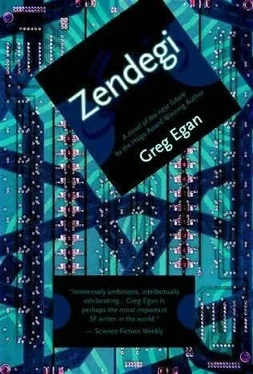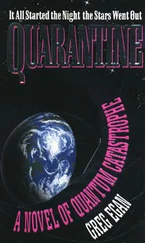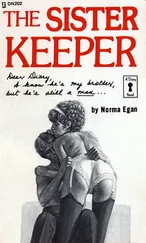He wanted to hear something by Paul Kelly, but he couldn’t make up his mind where to start so he let the software choose. ‘St Kilda to King’s Cross’ filled the headphones; Martin closed his eyes and leant back in the seat, beaming nostalgically. Next came ‘To Her Door’, a song about a break-up and reconciliation. Martin kept smiling, focusing on the power and simplicity of the lyrics, refusing to countenance any connection to his own life.
Something made a loud crackling noise. He tugged off the headphones, wondering if he was missing an emergency announcement by the pilot. But the plane was silent, save for the engines’ monotonous drone, and he could see a flight attendant chatting calmly with a passenger. Perhaps it had been some kind of electrical interference.
Halfway through the next song, ‘You Can’t Take It With You’, he heard the crackling sound again. He paused the song, skipped back a few seconds and replayed the same section. The noise was there again, as if it was part of the recording itself. But it didn’t sound like dust on the stylus, a scratch on the vinyl, or some random electronic pollution that had snuck into the circuitry from a mobile phone or fluorescent light. As Kelly’s voice surged it became the noise, as if something mechanical inside the headphones might be scraping against its housing when the sound became too loud. But when Martin replayed the track with the volume turned down two notches, the noise was still there.
He started playing other tracks at random. His heart sank; about a third of them had the same problem, as if someone had gone through his record collection with a piece of sandpaper. He pictured Liz flipping through the crates in the dark, urged on by the ghost of Peter Cook from Bedazzled. But petty vindictiveness wasn’t her style.
Haroun said, ‘You seem very angry with that machine. You’re welcome to borrow my laptop if it’s any help.’
Martin wondered nervously if the obscenities that had been running through his head had remained entirely unvocalised; it didn’t take much erratic behaviour for an overzealous flight marshal to pump you full of horse tranquilliser and lock you in the toilet. ‘That’s very kind of you,’ he replied, ‘but it’s nothing urgent. And I don’t think the problem’s with this laptop.’ He explained what he’d done with his music collection. ‘I checked the first seven or eight albums and everything sounded perfect.’
‘May I listen?’
‘Sure.’ Martin cued up an example of the strange blemish and passed Haroun the headphones.
After a moment Haroun gave a smile of grim satisfaction. ‘That’s wave shaping. I’m afraid you’re right: there’s nothing wrong with your playback, it’s part of the recording.’
‘Wave shaping?’
‘You set the recording level too high.’
‘But I checked that! I adjusted the level when I did the first album, and it was fine for at least six more!’
Haroun said, ‘The signal strength would vary from album to album. Getting the right level for the first few would be no guarantee for all the others.’
No doubt that was true, but Martin still didn’t understand why the effect was so ruinous. ‘If the level from the turntable was too high for the computer, why doesn’t the recording just… fail to be as loud as the original? Just lose some dynamic range?’
‘Because when the level is too high,’ Haroun explained patiently, ‘you’re not shrinking the waveform, you’re decapitating it. Once the voltage exceeds the highest value the sound card can represent as data, it can’t take it upon itself to re-scale everything on the fly. It just hits the maximum and draws a plateau there, in place of the true signal’s complicated peaks. And when you truncate a wave like that, not only do you lose detail from the original, you generate noise right across the spectrum.’
‘I see.’ Martin accepted the headphones back from him and tried to laugh off the setback. ‘It seems I’ll be paying these starving musicians a few more cents after all. I just can’t believe I wasted so much time and made such a bad job of it.’
Haroun was silent for a moment, then he said, ‘Let me show you something.’ He booted up his own laptop and summoned a website from his browser’s offline cache. ‘This book is a translation into English of a story in Arabic; it was published in the nineteenth century, so it’s now in the public domain. An American company obtained a copy and scanned it, making it available to the world. Very generous of them, no?’
‘I suppose so.’ Martin couldn’t see the screen clearly from where he was sitting, but the title bar read The Slave Girl and the Caliph.
‘Optical character recognition isn’t perfect,’ Haroun said. ‘The software can sometimes recognise that there’s been a problem and call on human help to patch things up, but that process isn’t perfect, either. This story is obscure, but my grandfather gave me a copy when I was ten, so I know that the heroine is named Mariam. This digital version, scanned from the English translation, has turned the “r” and “i” in her name into an “n” throughout. Mariam has become Manam – which, other than being an island off the coast of Papua New Guinea, so far as I know means nothing in any language.’
Martin said, ‘That doesn’t sound like a mistake the translator would have made. Not unless he was in the middle of an opium-smoking competition with Richard Burton.’
Haroun closed his laptop. ‘I’m sure no human was involved, beyond feeding the book down a chute, along with ten thousand others.’ He was smiling, but Martin could see the frustration in his eyes. He’d probably tried emailing these custodians of culture to put them straight, to no avail, while the grating error had seeped into mirror sites, multiplying irreversibly.
He gestured at Martin’s own damaged library. ‘With time and care everything could be preserved, but no one really has the patience.’
‘I was about to leave the country,’ Martin explained defensively. ‘I had a lot of things to do.’
Haroun inclined his head understandingly. ‘And why wouldn’t any traveller want to turn their fragile music into something robust and portable? But so many processes are effortless and automatic now that it’s easy to forget that most things in the world still play by the old rules.’
‘Yeah.’ Martin had to concede that; having treated the first few albums with care, he’d let himself imagine that the rest would follow as easily as if he’d merely been copying files from one hard drive to another.
‘We’re at the doorway to a new kind of world,’ Haroun said. ‘And we have the chance to make it extraordinary. But if we spend all our time gazing at the wonders ahead without remembering where we’re standing right now, we’re going to trip and fall flat on our faces, over and over again.’
‘Bidar sho! Agha Martin? Lotfan, bidar sho!’
Martin stirred, his head throbbing. He squeezed the button for the light on his watch; it was just after two in the morning. He recognised the voice: Omar, his neighbour from downstairs, was banging on the door, pleading with him to wake.
What was Farsi for fire? Martin had picked up a smattering of Dari – the Afghani dialect of Farsi – when he’d been stationed in Pakistan, but even after two months in Iran, most of it spent working with a professional translator by his side, his Farsi remained rudimentary.
‘Aatish?’ he called back. That was fire in Urdu, but he was fairly sure it was the same in both languages.
‘Na!’ Omar’s tone was impatient, but not baffled, so at least the question had made sense. ‘Lotfan, ajaleh kon!’ Omar usually spoke English with Martin, but whatever the emergency was it had apparently driven the language from his brain.
Читать дальше











